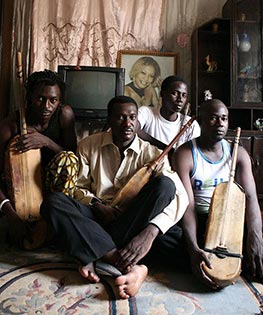Bassekou Kouyate & Ngoni ba
Country Mali Genres roots Website /bassekoukouyate Festival Sauti za Busara 2008 Bassekou Kouyaté & Ngoni Ba - Siran Fen

Bassekou Kouyate & Ngoni ba STOP PRESS +Bassekou gets great review at Festival in the Desert:
"The band and the singers are all enthusiastic, jolly performers, and Kouyate's groove gets most of the audience on their feet and chanting"
Rosie Swash, Guardian Unlimited http://music.guardian.co.uk/desert2008/story/0,,2239799,00.html
Other stories:
Segu Blue gets BBC World Music Award Album of the Year 2007 http://www.bbc.co.uk/radio3/worldmusic/a4wm2008/2008_bassekou_ngoni_album.shtml
Malian sensation Bassekou Kouyate is one of the greatest masters of the ngoni, an ancient traditional lute found throughout West Africa. Bassekou Kouyate & Ngoni ba is Mali's first ngoni quartet and the first band to focus on the ngoni, an instrument with a history that goes back to the 13th century in the days of Soundiata Keita, the founder of the Mali Empire.
Segu Blue was recently awarded BBC World Music Album of the Year 2007. It was recorded in Bamako under the loving production of Lucy Duran and features a wide array of guest vocalists including Kassé Mady Diabaté, Lobi Traoré, Ma Soumana and Bassekou's wife Ami Sacko (so-called the Tina Turner of Mali).
Segu Blue spent many months of 2007 at the top of the world music charts in Europe and has been hailed by Banning Eyre and many other music critics as one of the best African releases of the year. Bassekou Kouyate is also nominated for two categories of BBC World Music Awards 2008: Best Newcomer and Best Artist of Africa. http://www.bbc.co.uk/radio3/worldmusic/a4wm2008/nominees.shtml
Bassekou was born in a village called Garana about 60 kms from Ségou, in the remote countryside on the banks of the Niger river. He was raised in a traditional musical environment, his mother a praise singer and his father and brothers exceptional ngoni players. He moved to Bamako when he was 19, where he met and soon was performing regularly with Toumani Diabaté. Bassekou married the singer Ami Sacko and they are highly sought after for the traditional Sunday wedding parties that happen in the streets of Bamako.
The ngoni is the key instrument of griot culture. Unlike the kora whose history goes back only a few hundred years, the ngoni has been the main instrument in griot storytelling going back to the 13th century during the days of Soundiata Keita, the founder of the Mali Empire. The repertoire Bassekou plays is Bambara music from the region of Ségou. Bambara music is pentatonic in nature and as close to the blues as you can get in Africa. As Taj Mahal puts it "Bassekou is a genius, a living proof that the blues comes from the region of Ségou." While familiar griot melodies emerge on occasion, there is nothing routine about the song selection and arranging here. This is the work of a man who has thought long and hard about how to present his ancestral art in a new way.
Over the years Bassekou has collaborated with many musicians from his homeland Mali and beyond. Bassekou was one of the key musicians on Ali Farka Touré's award-winning album Savane, having previously toured with Ali Farka Toure, stunning audiences worldwide as the band's solo ngoni player. He has played in the Symmetric Orchestra alongside Toumani Diabate (kora) and Keletigui Diabate (balafon), was part of Taj Mahal's and Toumani Diabate's Kulanjan project and features on Youssou N'Dour's latest album Rokku mi Rokka. He has also recorded and performed with many Western musicians, including U2, Carlos Santana and Dee Dee Bridgwater.
Throughout 2007 Bassekou Kouyate & Ngoni ba wowed audiences touring Europe and beyond and have no doubt established themselves as one of the most exciting live acts of the moment.
 with thanks to CulturesFrance
with thanks to CulturesFrance
2025 2024 2023 2022 2021 2020 2019 2018 2017 2015 2014 2013 2012 2011 2010 2009 2008 2007 2006 2005 2004
Algeria Angola Australia Austria Benin Burkina Faso Burundi Cameroon Canada Cape Verde Comoros Congo Côte d'Ivoire Denmark DRC Egypt eSwatini Ethiopia Far East Finland France Gambia Germany Ghana Guinea Guinea Bissau Japan Kenya Lesotho Madagascar Malawi Mali Mauritania Mauritius Mayotte Morocco Mozambique Namibia Netherlands Nigeria Norway Pan Africa Pemba Puerto Rico Réunion Rwanda Senegal Seychelles Somaliland South Africa Sudan Suriname Sweden Switzerland Tanzania Tunisia Uganda UK USA Various Yemen Zambia Zanzibar Zimbabwe
acoustic acrobats afrobeat band blues bongo flava coastal comedy dance dj electro fusion hiphop jazz kidumbak pop reggae rock roots rumba spiritual spoken word taarab traditional urban zenji flava
